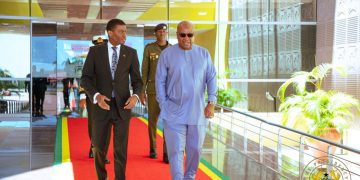African Caucus and IMF Reaffirm Commitment to Strengthen Africa’s Economic Resilience
The African Caucus meeting concluded with a joint statement from Mr. Wale Edun, Nigeria’s Minister of Finance and Chair of the African Caucus, and Ms. Kristalina Georgieva, Managing Director of the International Monetary Fund (IMF). The discussions focused on reinforcing Africa’s economic resilience amid a challenging global economic environment.
The leaders highlighted the complex issues currently facing the continent, including geopolitical fragmentation, elevated borrowing costs, and a persistently high cost of living, which are creating significant challenges for policymakers. In addition, social instability in some countries has exacerbated economic vulnerabilities, imposing heavy costs on populations and further complicating policy decisions.
Despite these challenges, progress has been made in curbing inflation, stabilizing public debt, and advancing crucial reforms. However, growth across the region is expected to decelerate next year, with significant disparities between countries. The IMF and African Caucus remain committed to prioritizing economic recovery, addressing macroeconomic imbalances, and creating fiscal space for essential development-focused investments.
New Initiatives to Support Economic Growth
A key development from the meeting was the introduction of the Joint Domestic Resource Mobilization Initiative (JDRMI) by the IMF and the World Bank. This initiative aims to strengthen domestic revenue generation, enhance public financial management, and ensure greater fiscal transparency in African economies.
The statement also underscored the need for more affordable financing to support development efforts, particularly in the areas of climate change adaptation and mitigation. The leaders emphasized that scaling up concessional financing is critical and called for increased support from international partners. The Resilience and Sustainability Trust (RST), designed to provide longer-term, low-cost financing for addressing climate and pandemic challenges, was highlighted as a key tool in this endeavor.
Revisions to Borrowing Policies Benefit African Countries
Among the significant policy changes announced, the recent review of the IMF’s Poverty Reduction and Growth Trust (PRGT) will enable the Fund to continue supporting low-income countries while maintaining the self-sustainability of the Trust. Revisions to the Surcharge Policy will reduce borrowing costs for countries with reduced credit exposure, benefiting several African nations starting November 1, 2024.
In a strategic move, the IMF also approved the use of Special Drawing Rights (SDRs) for acquiring hybrid capital instruments issued by multilateral development banks. This step aims to facilitate the channeling of resources to support development projects, including infrastructure and social programs.
Call for Fairer Representation in IMF Quotas
The meeting concluded with the endorsement of the 16th General Review of Quotas, which increased IMF member quotas by 50%. The African Caucus called for further work on quota realignment to better represent the economic contributions of developing nations. The announcement of a new Executive Board Chair for sub-Saharan Africa next month was welcomed as a positive step toward enhancing the region’s representation at the IMF.
Looking Ahead
The IMF and the African Caucus reiterated their shared commitment to navigating the economic challenges facing the continent while fostering inclusive and sustainable growth. With a renewed focus on governance reforms, efficient resource mobilization, and strategic investments, the partnership aims to ensure that Africa remains resilient in the face of global economic headwinds.








